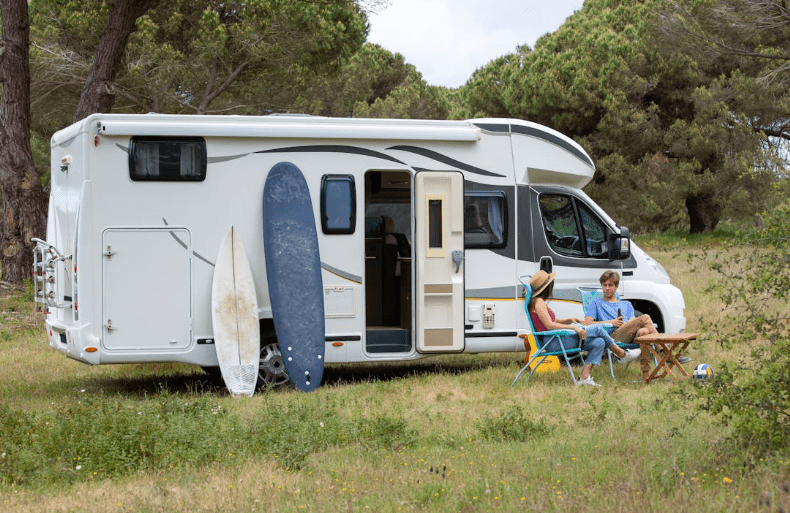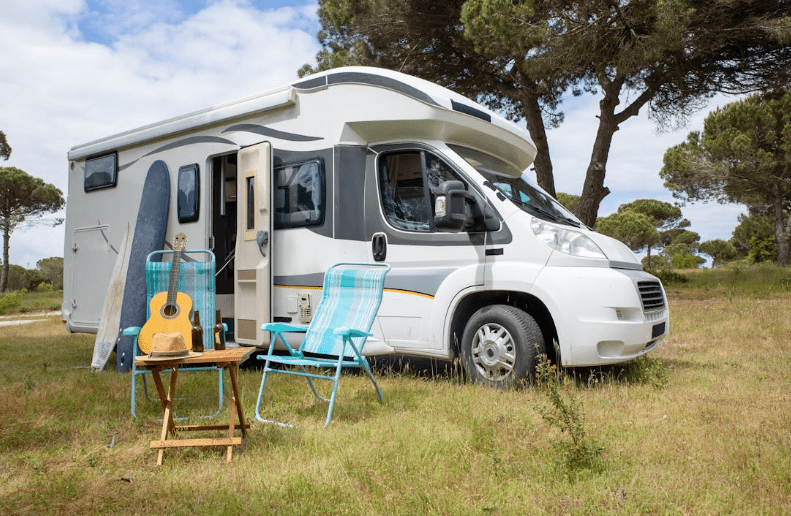As an Amazon Associate I earn from qualifying purchases.
When embarking on an adventure in your 30-foot travel trailer, understanding its weight is crucial for a safe and enjoyable journey. The weight of your trailer not only affects your vehicle’s towing capacity but also influences fuel efficiency, handling, and overall performance on the road. In this post, we’ll dive into the factors that contribute to the weight of a 30-foot travel trailer and provide guidance on how to determine its total weight.

Base Travel Trailer Weight
The base weight of a 30-foot travel trailer can vary significantly depending on the manufacturer, model, and construction materials used. On average, a 30-foot travel trailer has a dry weight (also known as unloaded vehicle weight or UVW) ranging from 5,200 to 5,800 pounds. This weight includes the trailer’s basic structure, exterior, and essential components such as the frame, walls, roof, and flooring.
However, it’s essential to note that the dry weight does not include any additional features or belongings added to the trailer. These can include appliances, furniture, water tanks, and personal items. Therefore, it’s crucial to factor in these additions when determining the total weight of your 30-foot travel trailer.
Factors That Influence Travel Trailer Weight

While the essential weight serves as a starting point, various factors can considerably affect the total weight of your 30-foot travel trailer. Let’s look at these things in more detail: The materials chosen to construct your travel trailer can have a significant influence on its weight. Aluminum trailers, for example, are often lighter than steel trailers. Similarly, fiberglass exteriors weigh less than wood or metal siding. As previously stated, a 30-foot travel trailer can weigh anything from 5,200 to 5,800 pounds. A larger or longer trailer will usually weigh more than a smaller one due to its higher surface area. Modern travel trailers are outfitted with a variety of extras, including several slide-outs, awnings, and outdoor kitchens, which can add to their overall weight. It is critical to include these elements when calculating the total weight of your trailer. Water tanks are an essential part of any travel trailer since they supply water for drinking, cooking, and other everyday activities while on the road. As a result, while calculating the overall weight of your 30-foot travel trailer, you must include the weight of your water tanks.
Stored Items
Personal goods and supplies you carry with you on your journey also have an impact on the weight of a trailer. Common goods include clothes and bedding. Food prep and kitchenware. Equipment and tools for upkeep and repair. A diverse selection of outdoor gear and leisure things may be found here. We utilize technology and entertainment gadgets on a daily basis. The weight of these components should be considered since they can quickly build up and affect the total weight of your trailer. When it comes to lowering the weight of your stored belongings, try downsizing or using lightweight alternatives.
Furniture and Appliances
The interior furniture and appliances put in your travel trailer add to its total weight. These things may include kitchen equipment (e.g., refrigerator, stove, oven, microwave). Bathroom fixtures include the toilet, shower, and sink.furniture (sofa, dinette, and beds). Cabinets and countertops.Heating and air conditioning units. The weight of these components can add hundreds of pounds to your trailer’s total weight. When evaluating the weight of your trailer, it is critical to consider these elements and ensure that they are uniformly divided for optimal weight distribution when towing.
How To Weigh a 30-Foot Travel Trailer

To precisely calculate the weight of your 30-foot travel trailer, follow these steps: Find a truck stop, weigh station, or garbage transfer station with approved vehicle scales. Weigh your towing vehicle: First, weigh your towing vehicle without the trailer connected. Include the driver, passengers, and any luggage in the car during the weighing procedure. Weigh your tow vehicle and trailer together. Attach your 30-foot travel trailer to your tow vehicle and weigh them together. Make sure your trailer is loaded with all of your gear, supplies, and passengers as if you were about to depart on a journey. Calculate the trailer’s weight. Subtract the weight of your tow vehicle (step 2) from the total weight of your tow vehicle and trailer (step 3). The calculated amount represents the actual weight of your 30-foot travel trailer.
Considering Individual Components
In addition to evaluating your complete setup, you should examine the weight of individual components and how they are distributed throughout your trailer. Towing stability and control rely on adequate weight distribution. Heavy things should be stowed low and near the trailer’s axles to reduce the possibility of wobble or instability on the road. Understanding the numerous components that contribute to the weight of your 30-foot travel trailer and following the procedures to precisely establish its overall weight will help you have a safe and comfortable towing trip. It’s essential to be aware that improper weight distribution can lead to serious safety hazards, such as swaying or even jackknifing. Remember to constantly check your vehicle’s towing capacity and follow the manufacturer’s specifications to prevent overloading your trailer or exceeding its limitations.
Conclusion
Taking the effort to weigh your 30-foot travel trailer appropriately is critical for safe and pleasurable journeys. By taking into account all relevant aspects and employing suitable weighing procedures, you may assure peak performance and minimize potential traffic hazards. Remember to check your trailer’s weight on a regular basis and make any necessary modifications to keep within safe towing restrictions. Enjoy your travels!
Amazon and the Amazon logo are trademarks of Amazon.com, Inc, or its affiliates.

